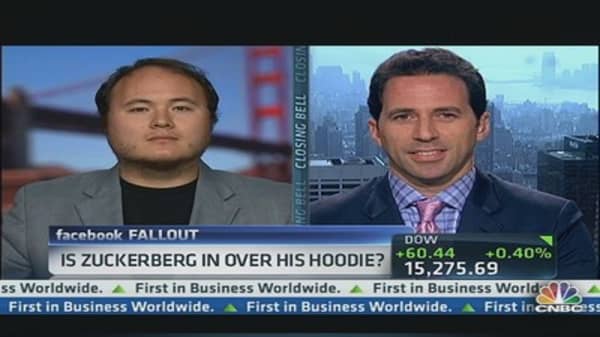The Facebook foibles have been legion.
(Look Back: 10 Things Facebook Underwriters Got Wrong)
From the hype machine that built up the IPO to the delay on the Nasdaq to begin trading on May 18 to the weak performance since, there's not a lot to like about the social network's experience on the publicly traded markets.
Shares are off more than 30 percent from the bloated $38 offering price and analysts wonder where future growth will come from.
Morgan Stanley, the underwriter that took so much heat for its handling of the Facebook deal, currently ranks eighth in IPO book-running in deal value and total deals, down from third last year, according to Dealogic.
But the Facebook IPO story is about more than dollars and cents.
It's another in a long string of episodes that diminished market confidence and raised questions from investors over whether they could ever get a fair shake.
"They realize that it's an institutional game," said Nadav Baum, executive vice president at BPU Investment Management. "If you talked to 10 retail investors, eight of them would say the stock market is a rigged game. The reality is over the long haul it's still the best growth vehicle in the world."
(Read More: This Bullish Indicator at 58-Year High)
Indeed, there's the rub.
For how much investors tire of hearing about flash crashes and high-frequency trading—and rigged IPOs where insiders get the best shot at shares—they still come back.
Such has been the case not just with the stock market in a broad sense, but also with IPOs.
Through the first-quarter of 2013, total deal numbers fell to 34 from 38 in the prior quarter and 45 for the same period a year ago. U.S. dollar volume surged year-over-year 34 percent to $7.8 billion, according to PricewaterhouseCoopers.
Last week saw the highest level of weekly IPO deal activity since December, 2007.
"At the end of the day the IPO markets are doing well. The biggest thing is how the IPOs are doing post-IPO, and the returns have been really, really good, far in excess of the broader market," said Neil Dhar, a PwC partner who specializes in IPOs.
"I wouldn't say it's great by any means, but it's pretty healthy. There's a lot of buzz around IPOs as a very viable way of accessing capital," he added.
Finance, technology and healthcare have been the three leading IPO sectors.
(Read More: Why Billion Dollar Start-Ups Should Thank the Fed)
The continued pace of deal-making activity reflects a healing in investor confidence, said Jim Paulsen, chief market strategist at Wells Capital Management.
Equity mutual funds, for instance, have taken in close to $70 billion this year after suffering 10 straight months of outflows.
"I'm seeing more and more evidence of confidence running through the stock market, and (IPO growth) would be another one," Paulsen said. "It seems investors are in a different place than they used to be."





